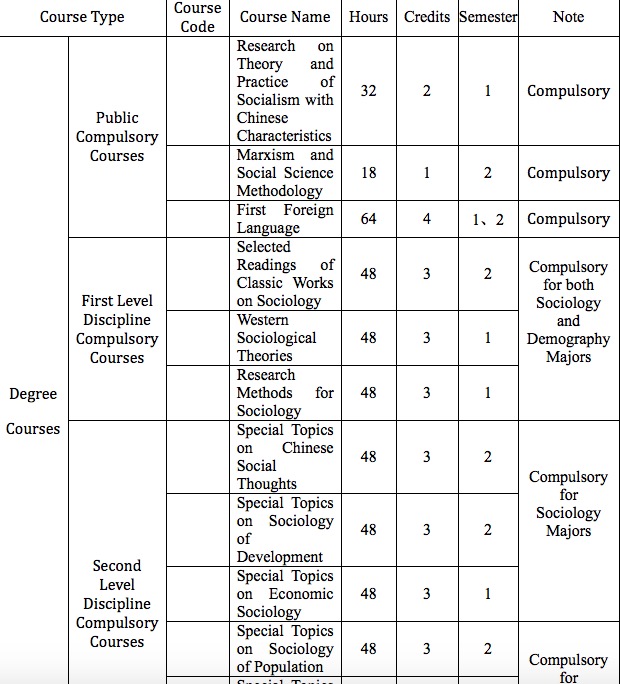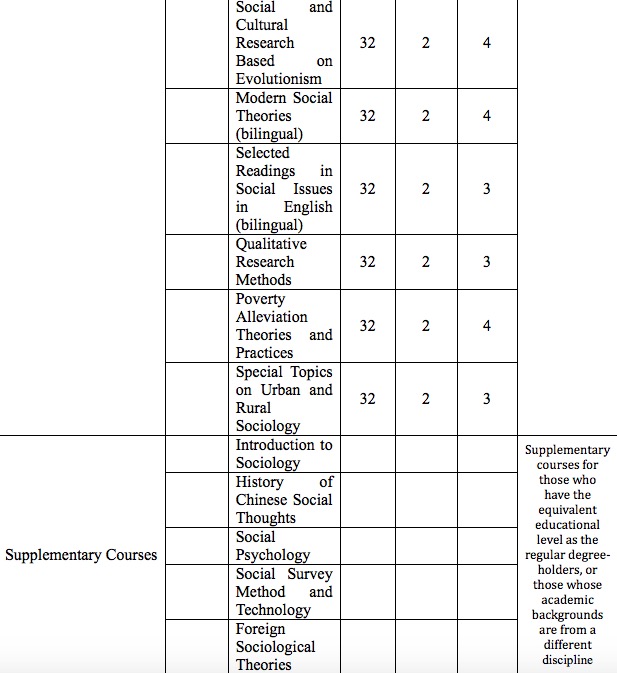Training Scheme for Master Students of Sociology (First Level Discipline)(0303)
I Training Objectives
This program aims at training high-caliber and all-round talents in sociology, who can meet the demands of economic and social development of China. Specific requirements are as follows:
1.Form the right view of the world, view of values, and view of life;
2.Systematically master the basic theories and professional knowledge in sociology;
3.Be familiar with the history, current situation and the development trend of sociology research both in China and internationally;
4.Systematically master the principles and methods of social survey and social study;
5.Have the ability to conduct independent research in sociological theories and practices;
6.Be proficient in a foreign language, especially when it comes to the areas of sociology.
II Research Directions
1. Sociology Major
(1) Theoretical Sociology: theoretical sociology mainly includes three aspects "theory", "history", and "methodology". “Theory” refers not only to theories in sociology, but also relevant social theories. “History” mainly refers to history of social thought and history of sociology, and also involves history of society.“Methodology” mainly provides perspectives and ways of thinking for analyzing problems.
(2) Sociology of Development: sociology of development mainly studies the reasons of the gap between the developing and developed countries, the influence of developed countries upon the social development and modernization of developing countries, the characteristics of the social development and modernization of developing countries, and the differences of characteristics and solutions of different developing countries’social development and modernization. This research direction is based on the practices of developing countries, while drawing on the experiences of the developed countries’ modernization process, and conducts a comprehensive study of the theories, approaches, and experiences of different countries’ modernization in the past hundreds of years.
(3) Economic Sociology: economic sociology is based on the theories and traditions of sociology, and mainly studies economic phenomena and economic issues from micro, medium and macro perspectives, through interaction with economics. The main focuses of this research direction are the macroeconomic policies, enterprise management,market, consumption and development issues during the process of contemporary China’s economic reform and development.
(4) Comparison of Poverty Alleviation Systems and International Development Assistance: This research direction is based on the theories of sociology of development, while combining the theoretical pathways and research methodology of sociology, economics, and politics, and conduct in-depth analysis of the differences of the poverty alleviation systems and practices between different countries, especially between China and other developing and developed countries. It also discusses the influence of International Development Assistance has on the poverty alleviation of developing countries. Through the study of this research direction, students are expected to have a solid mastery of international poverty alleviation theories and methods, understand the differences and similarities of poverty alleviation between China and other countries, and recognize the values of International Development Assistance in poverty alleviation, so as to provide new theoretical insights and practical methods for the development of China’s poverty alleviation work.
2. Demography Major
(1) Sociology of Population: sociology of population mainly studies the relationship and interaction of population development and social change. It also discusses the population situation during the development of society and culture. Birth rate, death rate, different types of migration, and population structure are the key issues of this research direction. Based upon the study of the interaction of social variables and demographic variables, it discusses the influence of social development upon population changes, and the consequences population changes cause to the development of society.
(2) Social Policy: this direction aims to train all-around talents in social work practice and social work management and social policy research, familiarizing them with fundamental knowledge in sociology and skills of social survey, and theories and practices of social work, as well as China’s social policies, so that they can be qualified and competent for the practices of social work and social work management. Upon graduation, the graduates are expected to be able to conduct managerial work and policy research work in the government’s social welfare departments, relevant social organizations, and grassroots communities, or conduct relevant teaching and research activities of social work and social policy in relevant education and research units, or they can conduct social work practices in enterprises and public institutions.
(3) Social Administration: social administration mainly studies how the government and social organizations coordinate with the operation of social systems, and their supervision and control over social systems, social life, and social development. It also conducts a systematical study of how to coordinate social relationships, guide social behavior, solve social problems, conciliate social conflicts, promote social justice, cope with social risks, and maintain social stability.
III Standard Program Duration, Maximum Duration, and Total Credits
The standard program duration is three years, the maximum duration is four years. The course study takes two year (though their focus during this period should be on course studies and practice activities, they can make some preparation for the academic dissertation), and the work of dissertation normal takes at least one year. We adopt the credit system, and the total credits required are 32-38 credits (16 hours/credit), among which 4 are credits for practice activities.
1.3 public compulsory courses are required, taking up 7 credits in total, among which 4 credits are for foreign language courses, and 3 credits are for political courses.
2.3 first level discipline compulsory courses are required, taking up 9 credits in total, and all the academic degree graduate students of our school must take the 3 courses.
3.3 Second Level Discipline Compulsory Courses are required for the students of that second level discipline (i.e., major); and for those who are not majoring in that second level discipline, those courses are elective.
4.4 Elective Courses are required, taking up 8 credits.
5.Practice Activities taking up 4 credits are required, among them 2 credits are for Social Practices, 2 credits are for Academic Activities.
6.Those who have the equivalent educational level as the regular degree-holders, or those whose academic backgrounds are from a different discipline or a different major, should take and pass the supplementary courses, which are mainly the core courses from the Bachelor Degree program of sociology. There is no credit for the supplementary courses.
7.Those who have finished their academic dissertation and all the required credits in advance, and meet the requirement of their discipline and the university, can apply for early oral defense and early graduation.
IV Curricular Design
The curricular design and teaching schedules are set according to the standard three years duration. For detailed course information, please refer to the <Curricular Design Form for Master Students of Sociology (First Level Discipline) >.
V Practice Activities
Master students should select two of the three following practice activities under the guidance of their supervisors, which take up 4 credits in total.
1.Social Survey Practice
Before graduation, Master students should participate in the social survey practices of different research programs, and the duration of the social survey practice should be at least one week long. The proof of these social survey activities should be presented to the Major Steering Group for evaluation. Those who pass the evaluation can earn 2 credits.
2.Teaching Practice
Master students can assist the teachers in teaching undergraduate students, including answering questions, holding class discussions, supervising social survey practices, supervising the writing of dissertations, reviewing of students’ coursework, and etc. The teaching practice is normally scheduled in the second year, and lasts for about four weeks. The workload of this teaching practice should at least be equivalent to 8 hours of lectures, and will be evaluated by the school’s Academic Committee. Those who pass the evaluation can earn 2 credits.
3.Academic Activity
Master students should attend 2-4 academic activities (academic lectures, seminars, and meetings), and record them in the <Registration Form of Graduate Students Participation of Academic Activities of CCNU>. The Major Steering Group should evaluate that before they graduate. Those who pass the evaluation can earn 2 credits.
VI Scientific Research
Master students must participate in the topic and dissertation survey and research of their supervisors, participate in the scientific research projects of their supervisors, and chose a topic to conduct survey and research. The means of the survey and research include field work, material collecting, data analysis, and etc., which are normally scheduled in the second year, last for twenty days in total, and subject to the practical needs and conditions of their supervisors.
Before graduation, Master students must finish at least two course papers, and two“academic-year thesis”. Those who apply for early graduation, should officially publish one paper (within the field of their major studies) in a CSSCI journal, as the first author, or as the second author when the first author is their supervisor, and in the name of CCNU. The paper must be officially published, and the notice of publication cannot substitute for the actual publication.
VII Academic Dissertation
1.Before the end of the fourth semester, Master students should decide the title of their academic dissertation, pass the opening report of their academic dissertation, make the work plan of their academic dissertation, and to ensure that when they pass the opening report of their academic dissertation, they will have at least 8 months left before their oral defense to write their dissertation.
2.The requirements for Master’s dissertation topics and the level of thedissertation are as follows:
(1)The dissertation topic should have theoretical and practical significance, and reflect the features of sociology discipline.
(2)The dissertation should have certain academic value, being innovative in its content or methodology.
(3)The dissertation should not only reflect the author’s good mastery of basic theories and research methods of his or her major, but also reflect his or her good research abilities.
VIII Training Mode
1.Pay attention to both class teaching and scientific research practice, both course study and dissertation writing, and pay attention to students’ theoretical study of sociology and social survey and research ability.
2.Combine class lectures with self-study. Means of self-study include: reading and studying reference books, submitting self-study summaries. Encourage Master students hold reading clubs, discussion groups, and academic salon, to improve their abilities of expressing, self-studying, and writing.
IX Required Reading
The reading list of required books and journals is attached at the end of this training scheme, please refer to the <Major List of Books and Journals for Master Students of Sociology (First Level Discipline)>
X Other Regulations
1.Assessment Method. The results of all the required course studies, practice and research activities, dissertation and other contents prescribed by this training scheme will have to be assessed. There are two assessment methods: exam and evaluation. Those who score 60 points in their exam, or get a “pass” in their evaluation, can get their credits. Degree courses and some elective courses have to be assessed by exams. The form of the exam can be either a written test exam, or a course paper. Those who do not pass the exams can attend make-up exams with the next year’s students. The average score of degree courses should reach 76 in order to be conferred a degree. The assessment of practices activities, the opening reports of academic dissertation, and other similar activities will be conducted by means of evaluation. Master students should attend the exams and evaluations in the prescribed time, and for those who cannot attend the exams and evaluations on time due to some special reasons, they have to apply for a “postponed exam” in advance, and their applications have to be approved by relevant leaders of the department and the school, before they can have a “postponed exam”. Those who miss the examwithout permission beforehand, their result for that exam is 0 point, and they cannot attend a normal make-up exam, but can only attend the make-up exam right before graduation.
2.Other things. Those who have the equivalent educational level as the regular degree-holders, or those whose academic backgrounds are from a different discipline, should take 2-4 supplementary courses, which are mainly the core courses from the Bachelor Degree program of sociology. The exam for the Master students of those supplementary courses will be the same with the undergraduates, and no credits will be earned through these courses. In accordance with this Master students training scheme, and under the guidance of their supervisors, every Master student should make their own personal training (learning) plan, within three months of their enrolment. The personal training plan has to be evaluated and approved by the supervisor and the head of the Major Steering Group, and then be submitted to the School of Sociology and the Graduate School to keep records. The completion of this training scheme and the personal training plan is the basic requirement for Master students’ graduation and degree conferment.
<Curricular Design Form for Master Students of Sociology (First Level Discipline)


